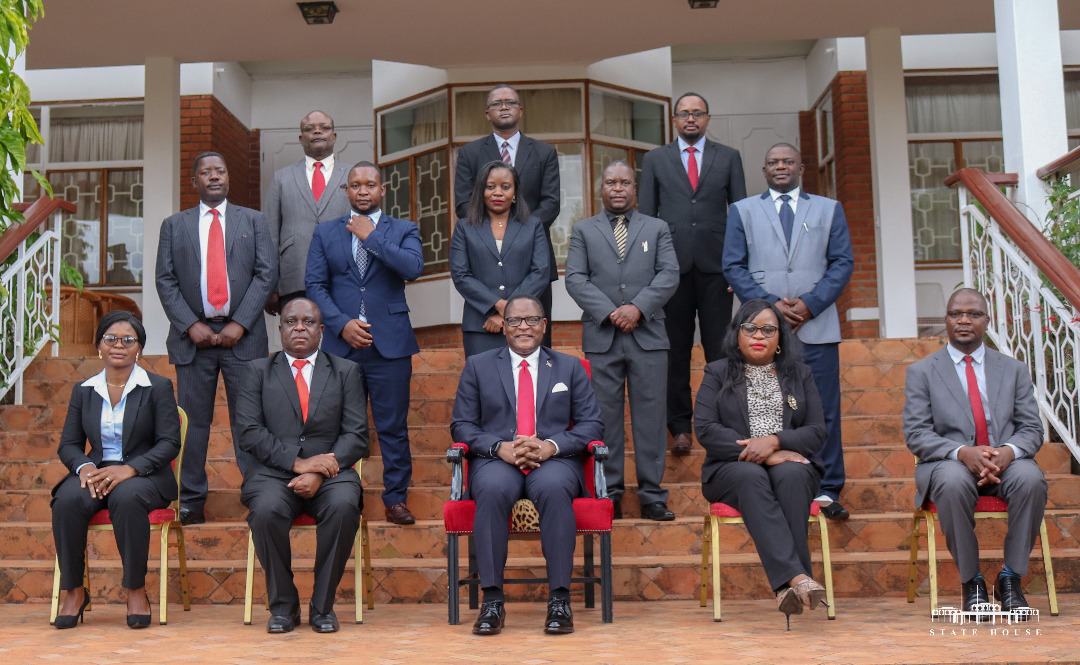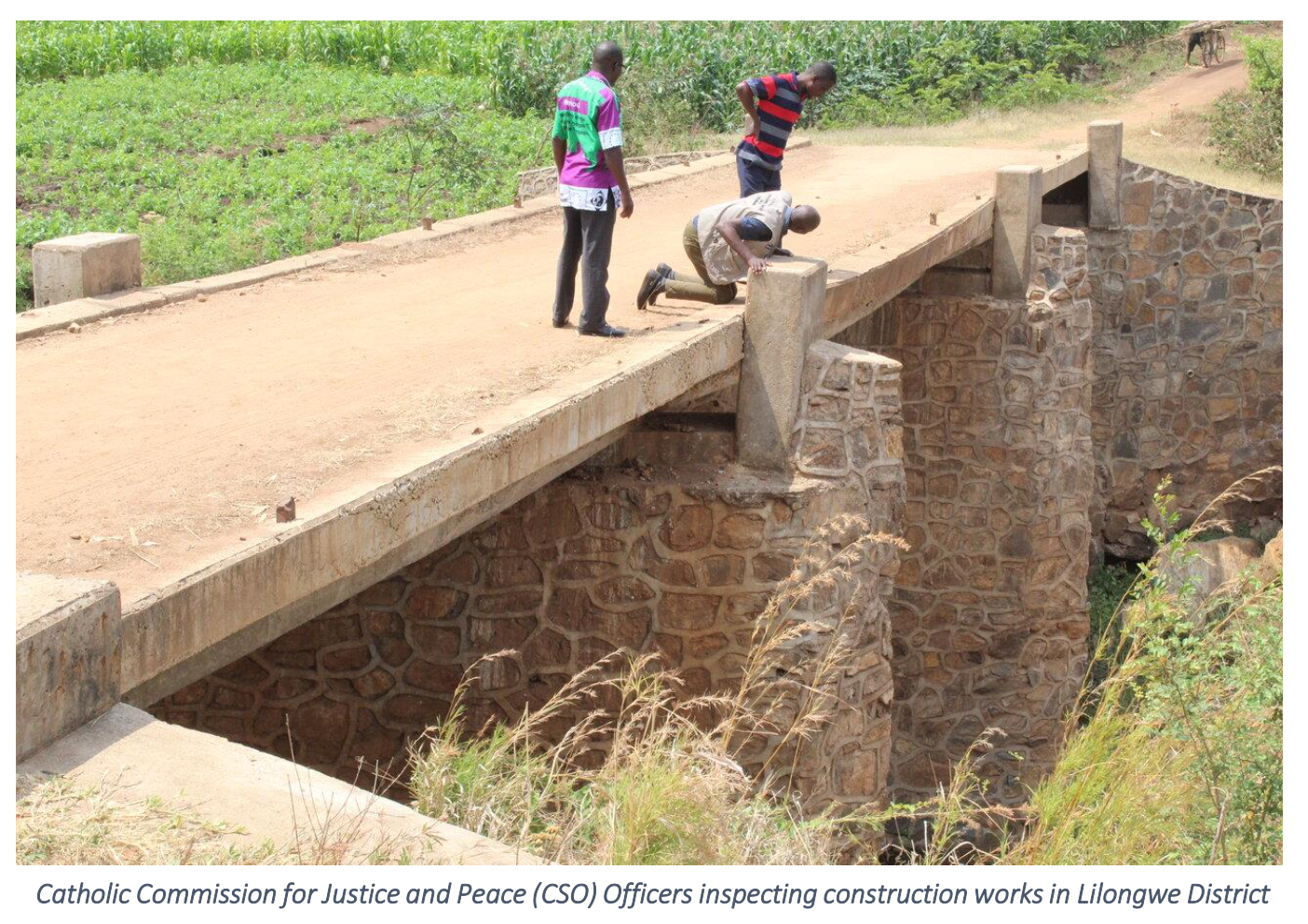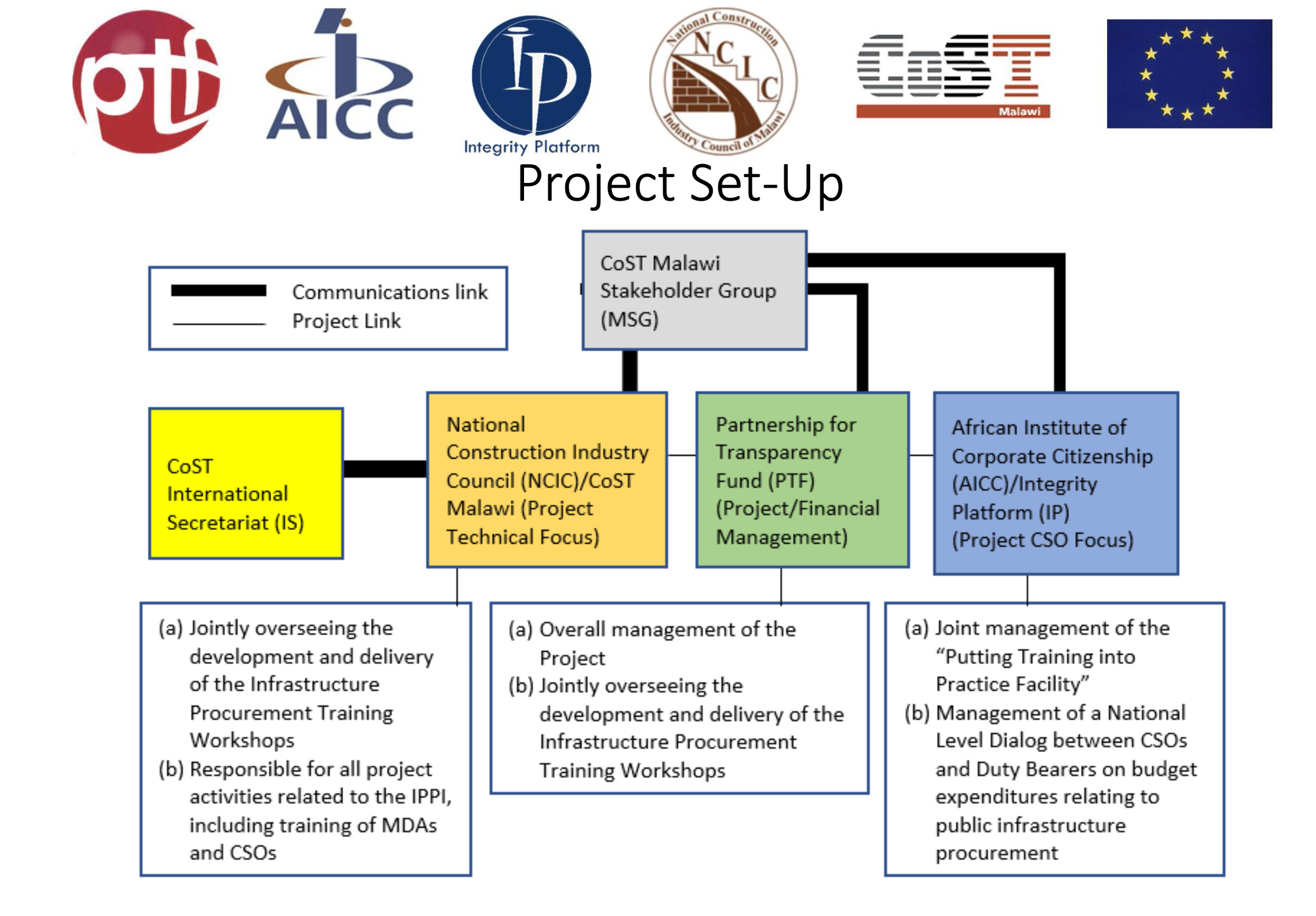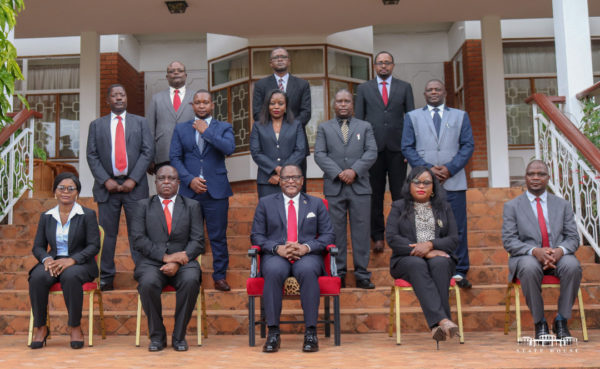Strengthening the Capacity of CSOs to Promote Transparency and Accountability in Public Infrastructure Projects in Malawi

Photo courtesy of the State House Malawi – Office of the President
Malawi Pilot Project Highlights Critical Lessons for Promoting Transparency and Accountability in Public Infrastructure
September 20, 2024 – The completion of a pilot project in Malawi provided deep insights into shortcomings in public infrastructure contracting, paths to meaningful transparency and accountability improvements, and the vital roles that civil society organizations can and should play.

(For a detailed discussion of this project please visit – Good Governance Academy)
Purpose
In November 2020, the Partnership for Transparency (PTF), in partnership with the African Institute of Corporate Citizenship/Integrity Platform (AICC/IP), the National Construction Industry Council/CoST- Infrastructure Transparency Initiative Malawi (NCIC/CoST Malawi) in association with the CoST International Secretariat (CoST IS) based in the United Kingdom, embarked on a three-year project to enhance the capacity of civil society organizations (CSOs) and journalists to engage in informed and responsible monitoring of public procurement infrastructure projects. With a three-month extension, the project was concluded on January 31, 2024.
The project aimed to enhance the transparency, fairness, and effectiveness of the public procurement process for infrastructure in Malawi through training and empowering civil society actors and investigative journalists to understand and monitor public procurement transactions. In addition, a project objective included the modernization of the Information Platform for Public Infrastructure (IPPI).
 Donal O’Leary, Project manager and PTF Advisor, noted: “The overriding lessons from project are that with some notable exceptions, Implementation of infrastructure projects in Malawi currently does not provide value for money and is deficient in accountability. Our project demonstrated that CSOs can help promote Transparency, Accountability and Anti-Corruption in Malawi’s infrastructure sector.”
Donal O’Leary, Project manager and PTF Advisor, noted: “The overriding lessons from project are that with some notable exceptions, Implementation of infrastructure projects in Malawi currently does not provide value for money and is deficient in accountability. Our project demonstrated that CSOs can help promote Transparency, Accountability and Anti-Corruption in Malawi’s infrastructure sector.”
Mr. O’Leary added: “ This pilot project underscored how, with the appropriate government commitment, CSOs can play an increasing role in improving accountability in all aspects of public infrastructure procurement, and ensure through effective communications that there is heightened transparency enabling citizens to become far better informed. I believe that a more substantial project should be developed to build on all that has been achieved with this pilot project.”
Achievements
Some of the project achievements (outputs/outcomes) included:
-
- The project enjoyed support at the highest level of Government in Malawi. President Lazarus McCarthy Chakwera continues to act as the CoST Champion in Malawi for infrastructure reforms. The President’s Delivery Unit (PDU) engaged with the MSG in October 2023, and participated in several training sessions with Ministries, Departments, and Agencies (MDAs) and Procuring and Disposal Entities (PDEs) to improve the project data input into the Integrated Platform for Infrastructure Projects (IPPI) to track project performance. This resulted in a significant increase in the number of projects capable of monitoring to a new total of 572 from less than 200 the year before.
- The project modernized the IPPI, which is managed by CoST Malawi, to improve transparency and accountability in infrastructure projects for the government and citizens of Malawi. This digital platform enables the publication of information on public infrastructure projects and contracts from the tender stage through to the completion of the project. The IPPI addresses inefficiencies, corruption, and waste in infrastructure procurement, which accounts for 70% of Malawi’s national budget expenditure. The project aligned the IPPI with the Open Contracting for Infrastructure Data Standard (OC4IDS), a global standard for releasing data and documents throughout the public procurement process. This has enabled the publication of information on at least 592 projects. available to the public, totaling 4.4 trillion Kwacha on the platform by 36 enrolled PDEs. The project focused on uploading correct data by PDEs and making it available for public reference. In December 2022, Malawi was accredited a prefix and mentioned as an OC4IDS publisher by the CoST help desk, making Malawi the third African country to receive this accreditation.
- The number of projects uploaded on the portal has significantly improved. Over the period November 1, 2022 through October 31, 2023 the total number of projects uploaded increased from 393 to 563 at the front end, and at the back end, the projects moved from 540 to 756. As of September 2023, one thousand five hundred active users were recorded to have visited the portal.
-
- CSOs are equipped to monitor infrastructure project procurement: Capacity-building activities were implemented to achieve the project’s objective. Two main activities were undertaken: development and delivery of training manuals. Progress was measured by reviewing progress indicators. According to the MTR, two training manuals were developed and used to train CSOs and Media. The project conducted training on advocacy and public procurement. Following recommendations made in the MTR, CoST Malawi conducted three regional refresher training sessions targeting CSOs, media, and PDEs. Training consisted of 14 sessions and spanned over three days. The feedback questionnaires completed by trainees at completion of the training indicated great satisfaction with the training, and take-home manuals on procurement were provided to all trainees.
- Starting in October 2022, a total of nine Civil Society Organizations (CSOs) were selected from among the CSOs that were previously trained to monitor public infrastructure project procurement at the national and district levels in Malawi using the Information Platform for Public Infrastructure (IPPI) and other sources of information to report on compliance with the formal disclosure requirements (FDR) regulations in public infrastructure procurement. Through cooperating with relevant duty bearers, CSOs promoted an evidence-based dialogue between duty bearers and CSOs to improve performance and budget expenditures in public infrastructure procurement.
-
- CSO’s demonstrated their capacities to monitor public infrastructure procurement: Based on a competitive selection process, twelve CSOs were assigned public infrastructure projects to monitor over 12 months. After refresher training, and with each CSO having access to an assigned project engineer, they successfully identified and resolved various issues. Nine CSOs monitored infrastructure project procurement, while three monitored district budgetary expenditures. They submitted a total of 12 final monitoring reports and four quarterly reports each. CSOs demonstrated their capacity to monitor public infrastructure, as highlighted in two success stories, mentioned below, that underscore the importance of linkages with media houses in enhancing transparency and accountability.
- One example related to the revelation of poor structural integrity and lack of a qualified site manager during the construction of the Mzimba stadium. According to the CSO responsible for the monitoring, COIDA, after contacting the Department of Buildings (DoB) – the national agency responsible for the project – everything improved and they had seen great progress.
- Another example related to the engagement of the CSO, GLOHOMO, with the DoB on the National Aquatic Complex in Lilongwe. In the second quarter of monitoring GLOHOMO reported that project data were not being updated on the IPPI portal. While the procurement department of the responsible agency – the Ministry of Youth – was not updating project information on the Portal, they had not been trained to do so. GLOHOMO contacted the DoB and convinced the project supervisor to take responsibility to upload the National Aquatic Complex data on the IPPI portal. The compliance level for this engagement improved from no data on the IPPI to 72% of the 36 field questions.
Project Objectives
The project is designed to enhance the procurement monitoring capability of CSOs in Malawi and will focus on achieving the following specific objectives:
- A sufficient number of CSOs will be trained to monitor public infrastructure procurement at the project level and analyze budget expenditures on public infrastructure procurement at the national and district levels in Malawi. This will include familiarizing trainees on using the Information Platform for Public Infrastructure (IPPI).
- Through cooperation with relevant duty bearers, CSOs will demonstrate their capacities to monitor public infrastructure procurement and analyze budget expenditures in public infrastructure procurement.
- The IPPI is fully operationalized to enable compliance with the FDR regulations in public infrastructure procurement.
- Evidence-based dialogue is promoted between duty bearers and CSOs in order to improve performance in public infrastructure procurement.
Project Activities
The project consists of four activities:
(a) Building capacity of CSOs to advocate for increased transparency, accountability, and integrity and monitor procurement at the national and local levels in Malawi in the water supply and sanitation, transport, and building sectors;
(b) Facilitating CSO involvement in public infrastructure procurement monitoring and advocacy programs by applying the skills they have acquired in capacity building activities;
(c) Establishing a national dialogue between CSOs and duty bearers on budgeting for infrastructure procurement.
Project Team
Donal O'Leary
Project Manager
Wayne Wittig
Adviser, PTF
Andrew Wells
Finance and Administration Officer, PTF
Joe Chingani
Board Chair, CoST Malawi Multi-Stakeholder Group
Lyford Gideon
Country Manager, CoST Malawi
Faith Chimwaza
Programmes Officer, CoST Malawi
Olive Kabatwairwe
Regional Manager, CoST Africa
Jeff Kabondo
Coordinator – Governance Programs, ACIC
Henry Mlinde
Monitoring and Evaluation Specialist, ACIC
About Our Partner
CoST – the Infrastructure Transparency Initiative (CoST) is one of the leading global initiatives improving transparency and accountability in public infrastructure. CoST works with government, private sector and civil society to promote the disclosure, validation and interpretation of data from infrastructure projects. This helps to inform and empower citizens and enables them to hold decision-makers to account. Our experience indicates that Informed citizens and responsive public institutions help drive reforms that reduce mismanagement, inefficiency, corruption and the risks posed to the public from poor quality infrastructure. Malawi joined CoST during the pilot stage in 2008, after the Government of Malawi expressed interest in the principles of the initiative through the Office of the Director of Public Procurement. The CoST approach is focussed on four core features: disclosure, assurance, multi-stakeholder working and social accountability. These features provide a global standard for CoST implementation in enhancing infrastructure transparency and accountability. The disclosure process ensures that information about the purpose, scope, costs and execution of infrastructure projects is open and accessible to the public, and that it is disclosed in a timely manner. Before Malawi joined CoST, infrastructure data was disclosed only at the contract award stage of the project cycle. Since joining CoST, this has developed to cover the entire project cycle.




